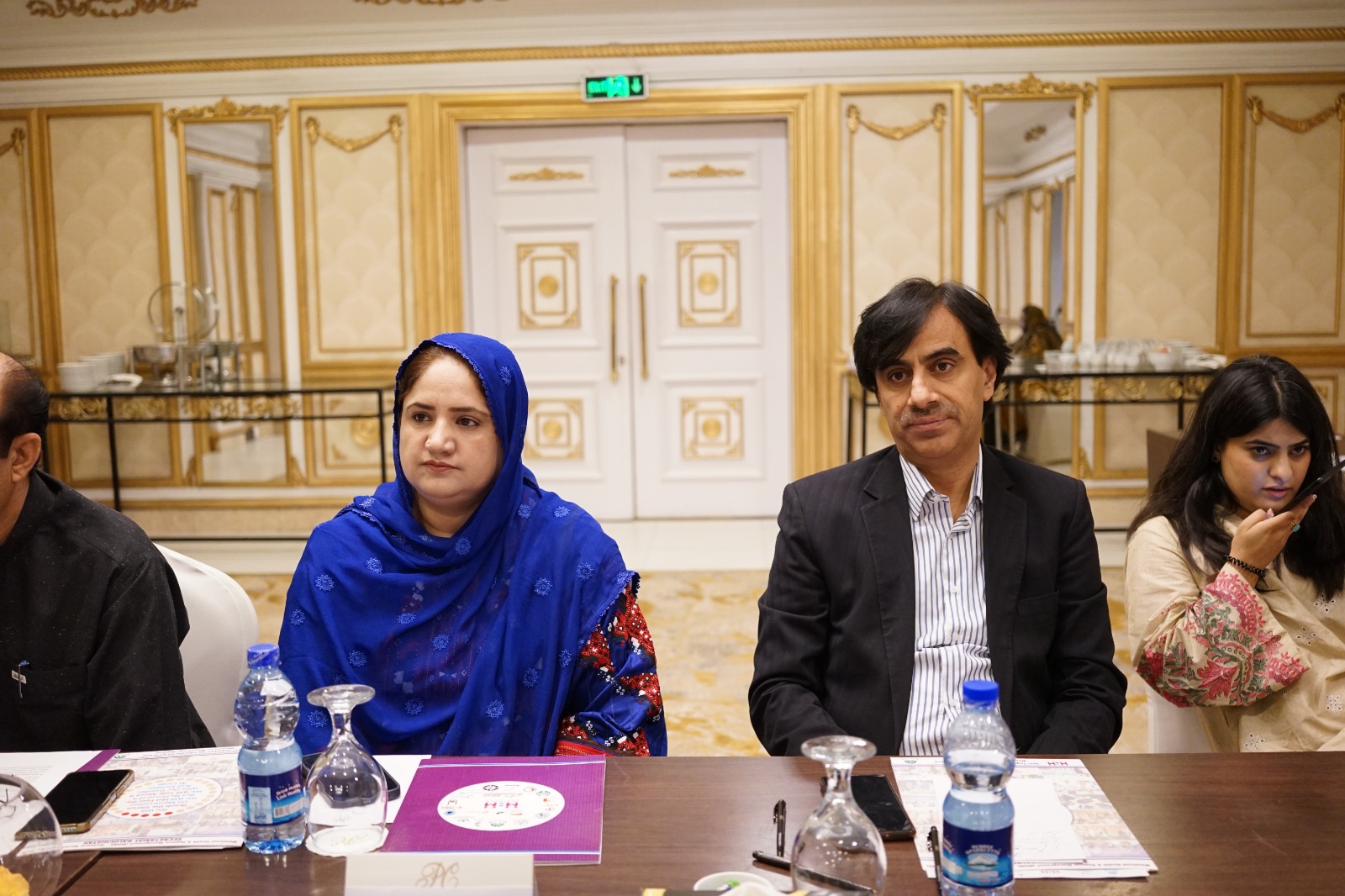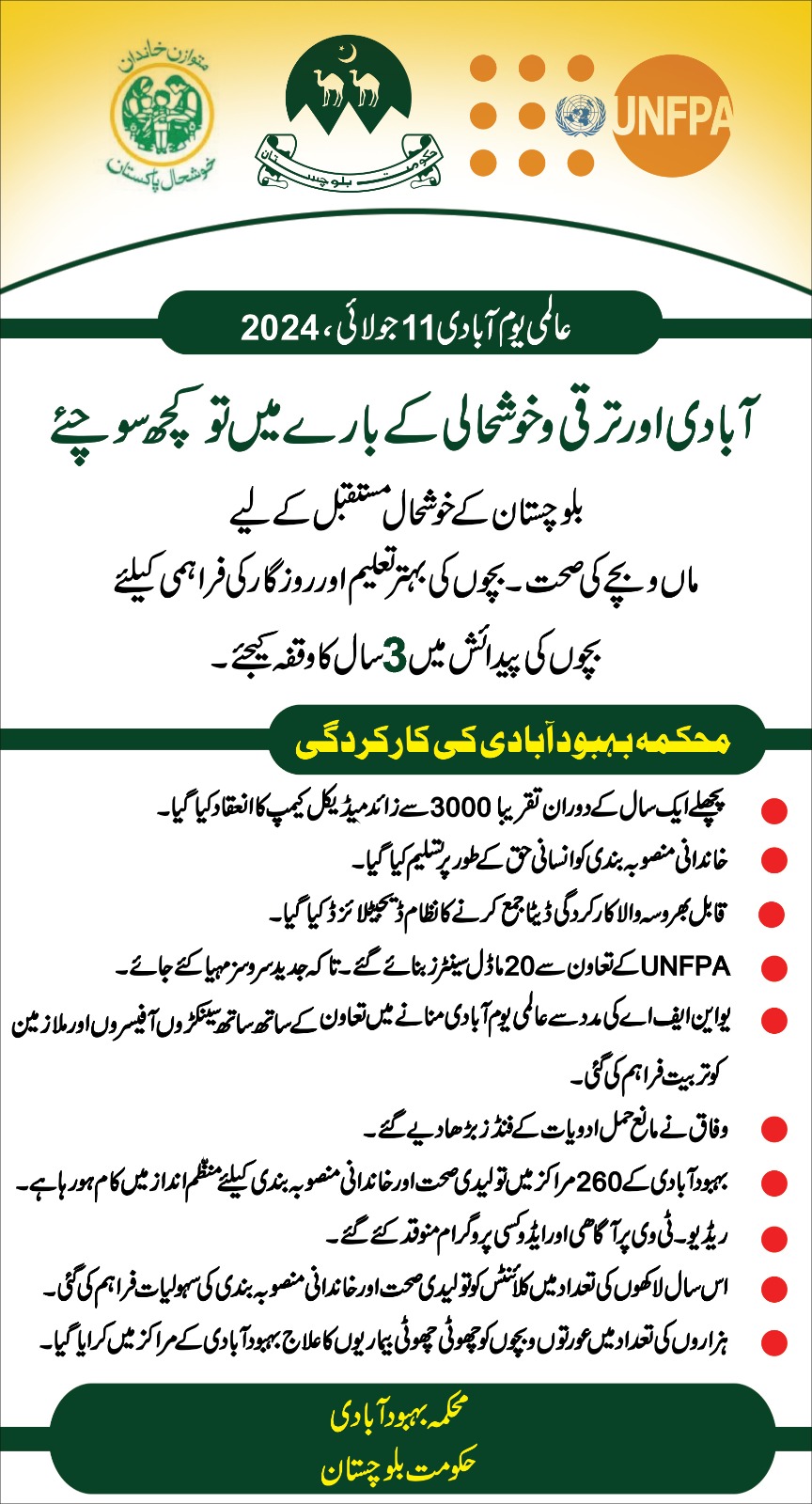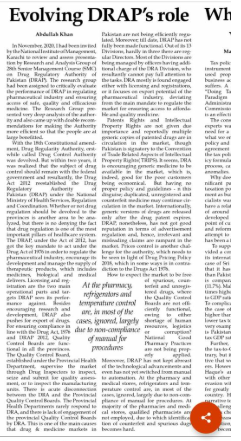Malnutrition in Balochistan
Balochistan is the poorest province of Pakistan with a poverty incidence of 48 per cent. It has water shortages across the region except for a few districts where water canals are providing water for agriculture. Overall, only three per cent of the land is agriculturally productive, while livestock contributes about 40 per cent of Pakistan’s total livestock population, where 70 per cent of the local population of Balochistan depends on livestock. The persistent draught starting from 1998 has adversely affected the agriculture and livestock sectors. According to studies, 20 of the 33 districts of Balochistan have faced severe drought where over 100,000 families and 1.7 million livestock have been affected. The drought has resulted in serious health and nutrition issues throughout the province. Moreover; in 2022, heavy monsoon floods caused devastations, resulting in heavy damages and the negative impacts on the health and nutrition status of the communities may aggravate in the years to come if drastic interventions are not timely taken. One of the major challenges for the government of Balochistan is malnutrition.
Malnutrition, in Balochistan province, is attributed to the aforementioned factors, where; according to the Pakistan Demographic Health Survey (PDHS) 2017-18, 73.7 per cent of adolescent boys and girls are suffering from anaemia; while 39.5 per cent of children aged 6 to 12 years are iodine deficient. The National Nutrition Survey(NNS) 2018 has reported vitamin D deficiency in 80.7 per cent of non-pregnant women, who are also suffering from haemoglobin deficiency. Moreover; according to the PDHS 2017-18, stunting, wasting and underweight children also occupy a considerable number wherein 18.9 per cent are wasted, 46.6 per cent are stunted and 14.4 per cent are with low birth weight. Both the NNS and PDHS depict very alarming situations of malnutrition and poor health indicators in Balochistan.
It is generally reported that lack of handwashing is also a serious factor that results in diseases and ultimately in malnutrition. According to the PDHS 2017-18, only 29 per cent of children are fully immunized, while 29 per cent are vaccinated against diseases. With this low vaccination in Balochistan, women and children are at higher risk of diseases that may ultimately add to Malnutrition. Major causes for low vaccination in Balochistan are lack of vaccinators, lack of proper cold chain maintenance in the districts and the community level, absenteeism, lack of monitoring, lack of awareness among the communities to accept and cooperate for vaccinating their children and, above all, poor performance of the Expanded Program on Immunization. Moreover, poverty, scattered population and cultural unacceptability of vaccination also contribute to low vaccination that ultimately results in diseases and malnutrition, especially among children.
Balochistan Food Authority, as per the law, has the mandate to enforce the legislation and regulate all the mills in the province to make sure only fortified flour, oil/ghee and slat are supplied to the market.
Since a full-ranged, well-structured and multifaceted system has not yet been in place, the nutrition indicators have not improved. Some interventions such as salt iodization, and preventive measures through the national program for LHWs and through the project: Balochistan Nutrition Program for Mothers and Children have been in place. The polio eradication Initiative through the Emergency Operation Centre working in coordination with the Health Department and other key stakeholders including technical and operational support provided by WHO and UNICEF has helped greatly in vitamin A supplementation in the province. Moreover, the low exclusive Breast breastfeeding rate shows that still a large number of children up to 6 months are deprived of a very essential source of nutrients, meaning they are at risk of malnutrition and diseases. Poor feeding practices are another factor contributing to poor health and nutrition deficiencies in children.
RECOMMENDATIONS: Though there is little realization about nutrition in Balochistan, much more is needed to sensitize the political leadership and the stakeholders. The Scaling Up Nutrition(SUN) Secretariat, established at the Planning and Development Department, Government of Balochistan should take the lead to advocate for pooling up of resources under a robust policy to be formulated taking all the stakeholders on board.
Nutrition should be made a regular part of the institutional set-up duly funded through the regular budget. In the Department of Health and the Balochistan Food Authority, the posts of nutritionists, dietitians and health & nutrition officers and food experts should be created. The multispectral approach is the only response the world has recognized to address the issue of malnutrition as malnutrition is a multifaceted phenomenon. The policy and action plan to be formulated shall contain a multi-sectoral approach involving all the government departments, the NGOs, civil society organizations and the market. The strategy to be devised by the government of Balochistan should cover both nutrition-specific and nutrition-sensitive interventions.
The Government of Balochistan has passed the Balochistan Food Fortification Act, which declares wheat flour fortification, edible oil fortification and salt iodization mandatory. The Government, in partnership with the donors and partners, shall provide support to the Mills in the province to establish infrastructure for fortifying the product. The Balochistan Food Authority, as per the law, has the mandate to enforce the legislation and regulate all the mills in the province to make sure only fortified flour, oil/ghee and slat are supplied to the market. Policy and plan for creating awareness among the communities about the importance of nutrition and food fortification need to be devised in consultation with all the stakeholders. All the vertical programs, under the Department of Health, working on mother health, child health and nutrition should be impetrated for efficient service delivery. Moreover, vaccination programs should be scaled up to ensure maximum vaccination coverage.
The writer is a Provincial Civil Servant, currently posted as Secretary Population Welfare Department Balochistan – Pakistan, and a policy analyst. Read more
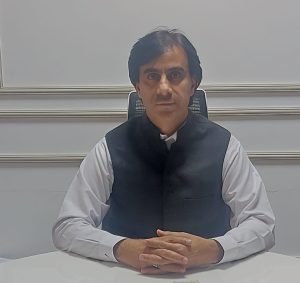
Reproductive Health and Family Planning Slogan—the Case of Balochistan

When taken up with policymakers, especially the political leadership, the issue gets confused with the land mass of the province which, they argue, is big enough to accommodate 14.89 million people. Particular reference is given to the natural resource abundance, highlighting the hidden mineral treasures and long coast of about 770 km, with a huge stock of fisheries, potential for tourism, and trade prospects through long borders with Iran, Afghanistan, and the sea at Gwadar. Moreover, the policy paradox of assigning 82.98 weightage of national financial grants to the population triggers a race among the provinces to increase their population, or at least show exaggerated figures to secure higher resource allocation. This, indeed, is true in essence that the provinces depend highly on the National Finance Commission (NFC).
Addressing the rapid population growth and demographic transitions while responding to prevalent anti-family planning arguments, it is crucial to recognize that the province of Balochistan grapples with a pressing issue of water scarcity. We should not content ourselves with the abundance of other natural resources; water stands as the most invaluable and irreplaceable of them all. The water table, in the last two to three decades, has gone to an alarming low level. The reasons are persistent drought for more than a decade, the influx of Afghan refugees after the USSR intervention in Afghanistan, excessive groundwater mining, and mismanagement of water for irrigation and agriculture development. The situation is going to be even worse owing to the introduction of cheap solar technology, which makes me recall the book, the Plundered Planet by Paul Collier, Professor of Development Economics and Public Policy at Oxford University wherein he expounds the formula: Natural Resource + Technology – Regulation = Plunder, and in our case, the cheap solar tube well technology is causing water plunder, which is sure to result into the tragedy of the commons. So, we need to plan and balance the population and natural resources, particularly water, in order to attain sustainable development. Read more…..

Population Boom in Balochistan: Public Policy and Development Challenge

At the core of these crises is unbridled population growth in the province, which has the potential to undermine the very roots of society. The traditional approach of policymakers in Balochistan is to draw comparisons between the population and the vast mineral wealth, landscape, and resources of the province. This viewpoint originates from a purely political standpoint, where the National Finance Commission (NFC) grants a heavy weightage, 82.98%, to the population for a share in the divisible pool. This casts a dark shadow on the consequences of population growth on women, children, and their basic human rights. In fact, the human rights-based approach to family planning is a systematic process to ensure that attention to human rights principles pertaining to family planning is rooted in all program phases (UNFPA). A cursory glance at the data shows that the population of the province in 1951 was 1.2 million, which has grown to 14.89 million in 2023, reflecting a more than tenfold increase. The population in urban areas was 28% in 2017 against 72% rural, which has become 31% in 2023 against 69% rural. Poor law and order, unemployment, intermittent drought, and the adverse effects of climate change are pushing the rural population to shift to urban areas, presenting another heavy challenge for the government. Studies show that a lack of reproductive health (RH) and family planning (FP) results in poor health indicators, such as high maternal mortality, child mortality, infant mortality, and malnutrition. There is a vicious cycle of high child mortality and lack of family planning leading to high fertility rates and maternal deaths. High child mortality is not only a cause but also a consequence of a lack of family planning. Read More……

PWD secretary emphasizes importance of reproductive health
Addressing the occasion of a one-day awareness seminar titled “Uplifting Ceremony of the Population Welfare Programme,” he stressed to the participants the need to disseminate the message of the department in all corners of Balochistan. Present among the participants were Director General PWD Muhammad Azeem Kakar, Director PMCT Naeem Khan Kasi, Director Admin Juma Khan, district officers, and a large number of women participants from Balochistan. The Secretary of Population Welfare was of the view that true women empowerment lies in creating awareness among women regarding their reproductive rights, adding that the ideal of a healthy society can only be achieved through empowering women. He said that stunted growth among children, anemic mothers, and malnourished youth are all due to a lack of awareness about family planning, which is a lifesaving intervention. He stated that the PWD has been mandated for this specific component of healthcare because of its high importance, as it has the capacity to shape a healthy future for the province and the country. He mentioned that mothers who undergo repeated pregnancies give birth to children who are weak, malnourished, and deprived of their mothers’ breast milk, which leads to a phenomenon of youth who cannot even enter the workforce due to deficient health. He noted that although education is important for the formation of a vibrant society, without proper health, the idea of an educated society cannot be achieved. He urged the participants to disseminate the message of the department to every woman in the province and be a part of the mission of the department. Towards the end, certificates/orders were distributed among the participants of the event, and Director General Muhammad Azeem Kakar thanked all the participants for coming to the event from the remote corners of the province. link
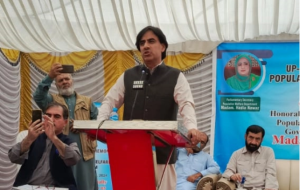
Family planning essential for reducing MMR: Speakers
QUETTA (6 AM Report): Parliamentary leaders and health sector specialists on Tuesday have called for a robust strategy, political and financial support for the reproductive healthcare programmes in Balochistan to reduce high death rates of mothers and children.Speaking during a one-day awareness seminar organized by Population Welfare Department in collaboration with United Nations Fund for Population (UNFPA) and the Pathfinder International Balochistan chapter here in a local hotel, the speakers unanimously agreed that family planning is key to reducing the mother mortality rate (MMR), Infant Mortality Rate (IMR) and building up a resilient, healthy and robust society that is prepared for all modern day challenges. Read More ……

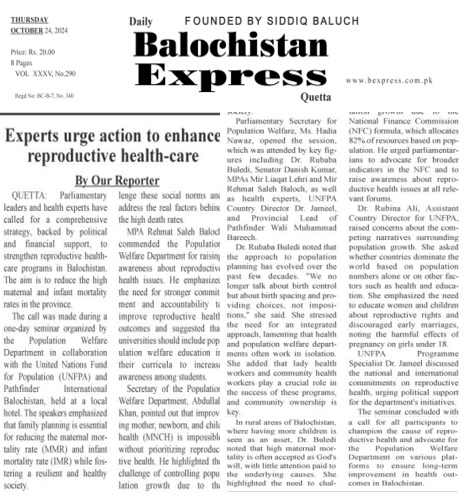

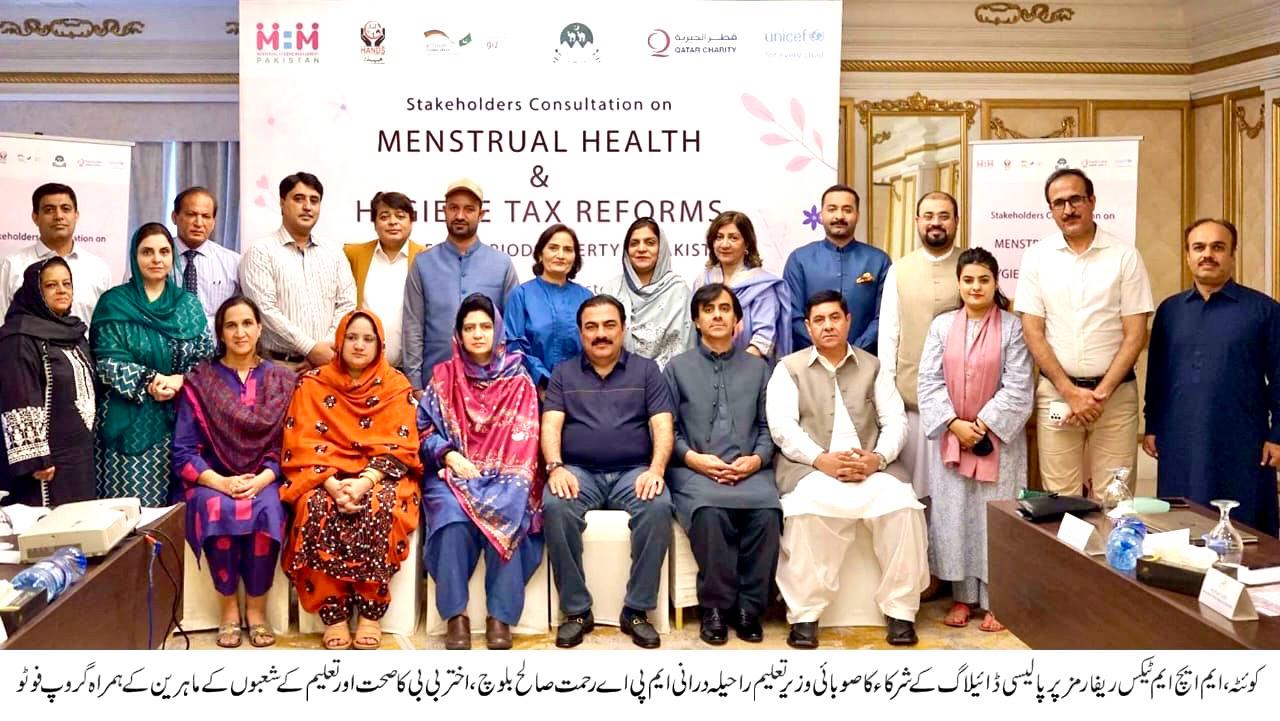
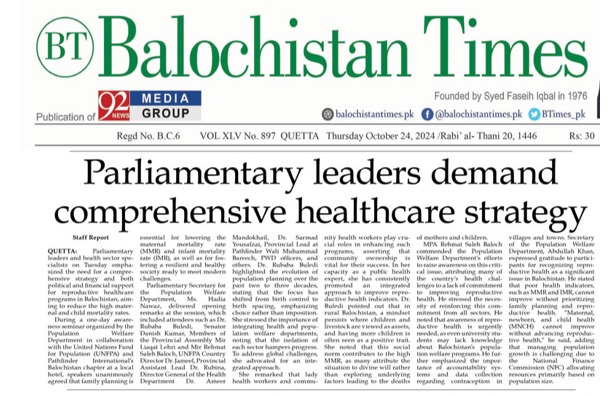
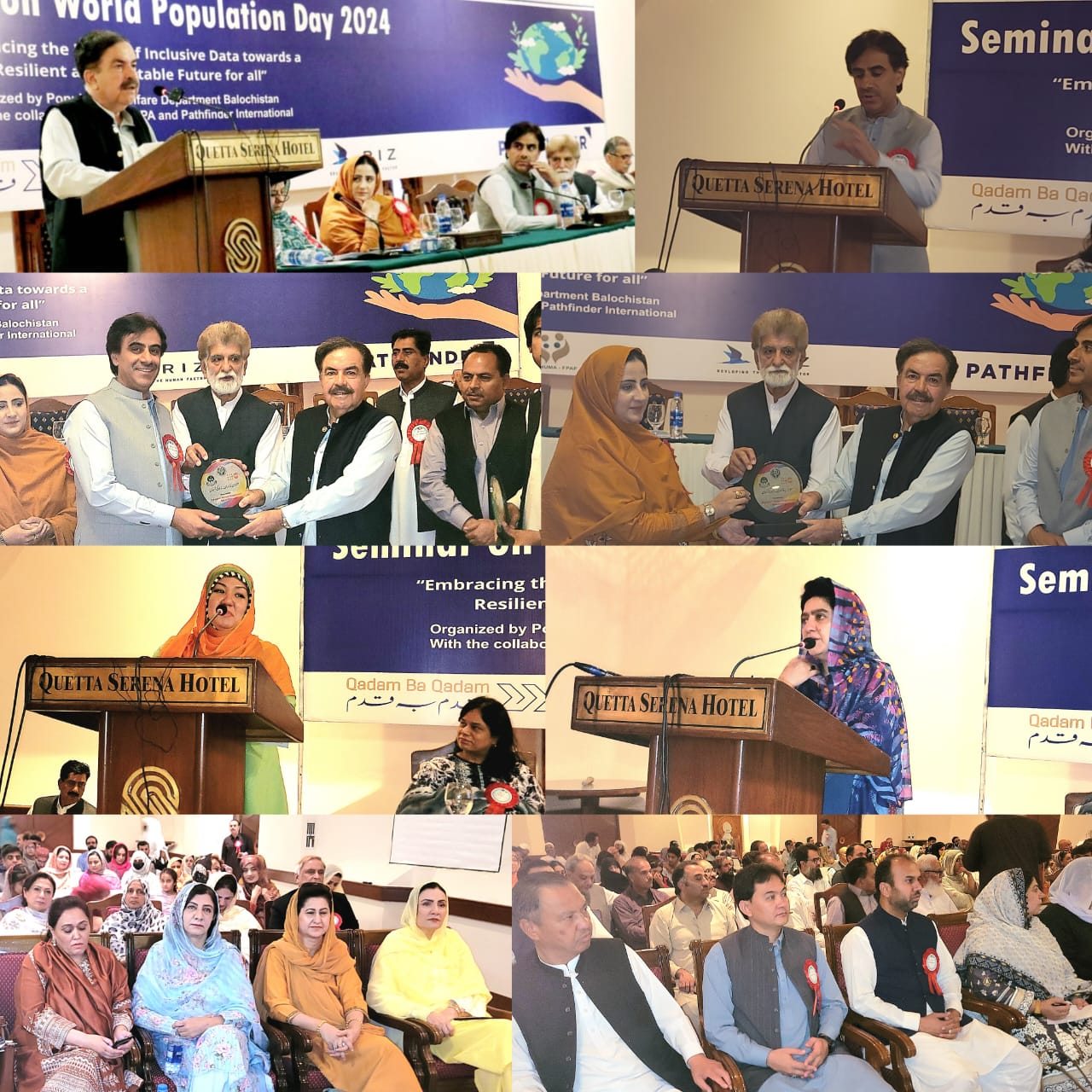
We are pleased to share that HSA Global Health Department conducted Pandemic Preparedness Mock exercise at Health Services Academy, Islamabad. Global Health Dean Sheraz Khan and his team Fatimah Tu Zahra, Kashif Jawwad, Noor, Fizza Javed and Iqra Ashraf presented this thought provoking work, earning applause from the conference organizers.
CEPI (Coalition for Epidemic Preparedness Innovations), GIZ Pakistan,European Union in Pakistan, Brown University Pandemic Center, UK Health Security Agency, Centers for Disease Control and Prevention, Gavi, the Vaccine Alliance, WHO Hub for Pandemic and Epidemic Intelligence, Robert Koch Institute, GOARN – Global Outbreak Alert and Response Network, WHO Collaborating Centre for Public Health Education and Training, Imperial College London, Tedros Adhanom Ghebreyesus, Sania Nishtar, Anders Nordström, Adnan Hyder

The Program Officer RMNCAH WHO Dr. Noor Bibi is presenting Family Planning Recording Tools to Secretary Population Abdullah Khan. The Divisional Director Quetta Abdul Sattar Shahwani and WHO Quality Care Officer Ms. Maryam Baloch were also present
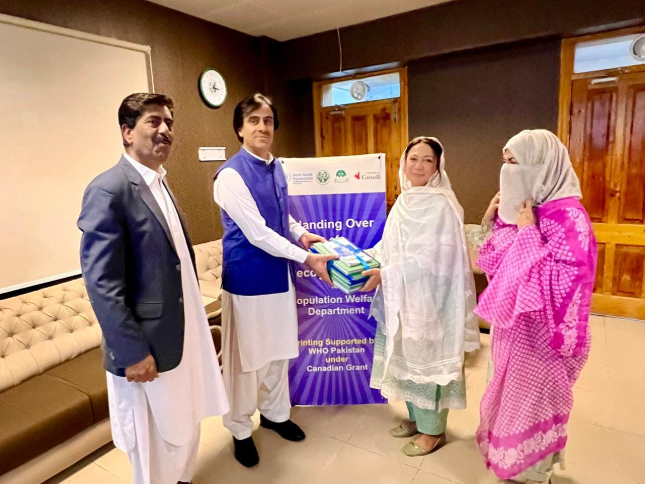
Parliamentary Secretary on Population, Mrs. Hadia Nawaz, chaired a meeting on Balochistan’s Population Program. Emphasized demand creation for family planning, integration with health, and engaging social mobilizers. Secretary Abdullah Khan briefed on department initiatives.
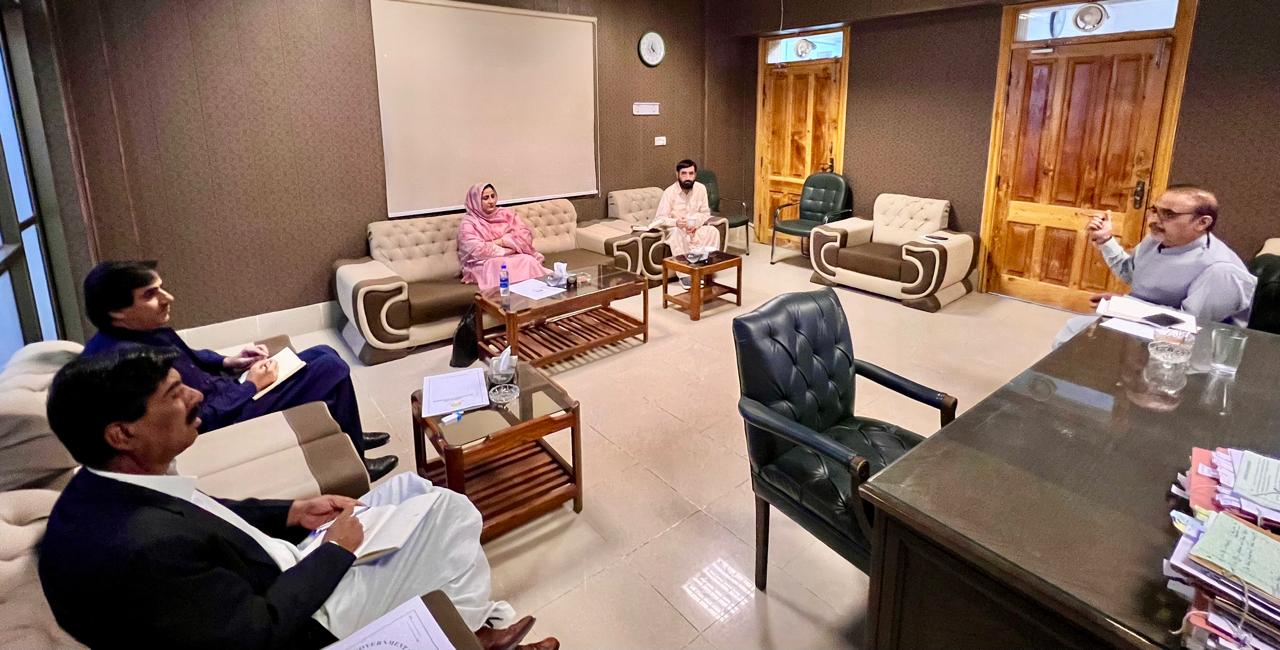
Dialogue with the Parliamentarians of Balochistan on Family Planning
An Awareness and Advocacy Session on reproductive health and Family Planning was organized by the Population Welfare Department for the Parliamentarians of Balochistan to sensitize them about reproductive health indicators and issues.
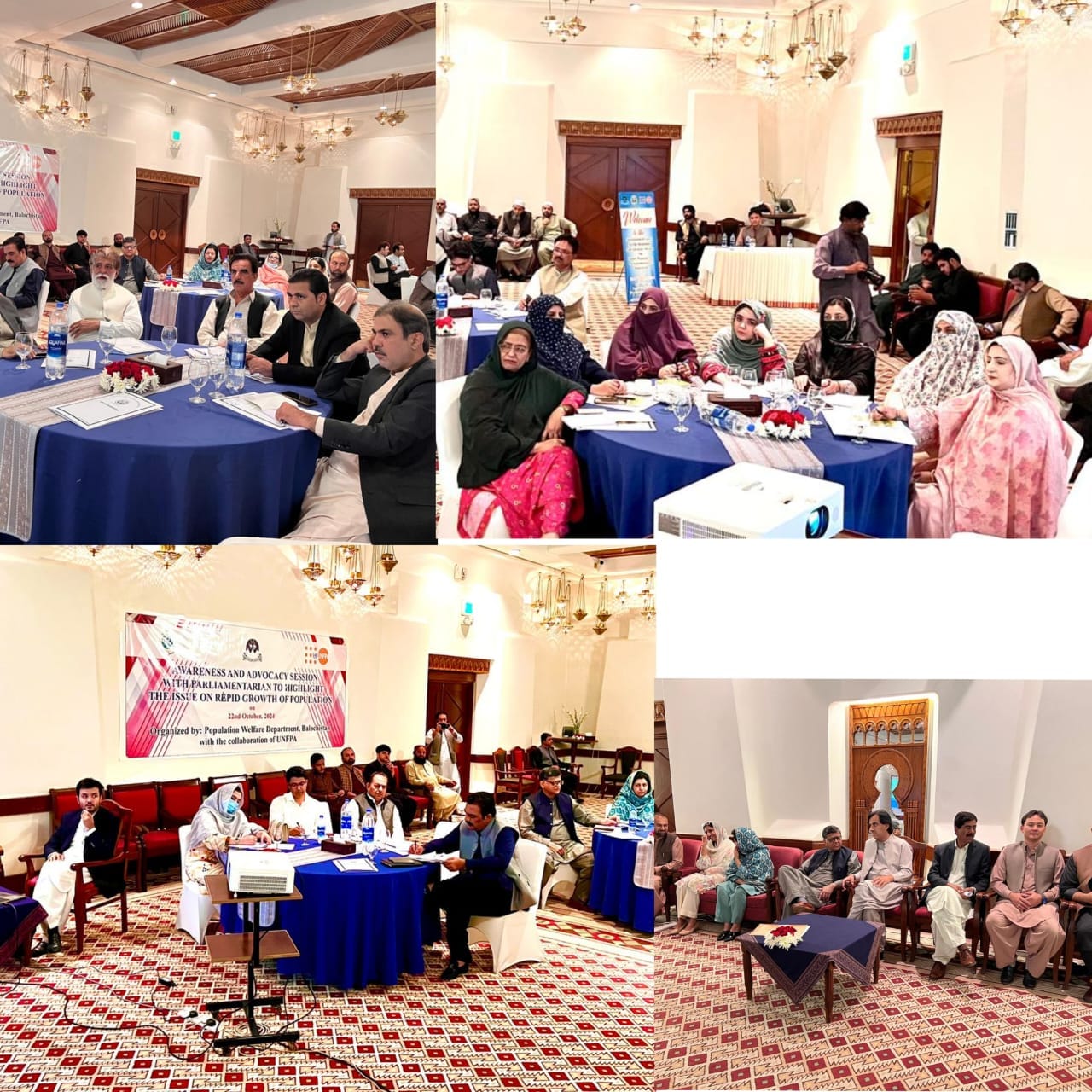
SBBMU organizes conference on Family planning
LARKANA – Shaheed Benazir Bhutto Medical University (SBBMU) Larkana organised first international conference under the theme of “Family planning, the way to increase the age to a sustainable world” on Thursday in Chandka Medical College Auditorium hall. Provincial Minister for Health Dr. Azra Fazal Pechuho Health and Population Minister was the chief guest. Dr Pechuho highlighted that linking assembly seats to population numbers may hinder population reduction efforts. She also stressed that Sindh’s combined Department of Population and Health should be replicated in other provinces, like Punjab and KPK, to tackle health and population issues effectively. Secretary of Population Welfare Department Balochistan Abdullah Khan noted that Pakistan’s rapid population growth, currently ranking fifth globally, may lead to it becoming the fourth most populous country in 26 years. Parliamentary Secretary of Health and Population Department, Nida Khuhro, Secretary Health Sindh Rehan Iqbal Baloch, Secretary Population and Welfare Hafiz Abdul Hadi Bulo, Vice Chancellor Shaheed Benazir Bhutto.

Abdullah Khan Secretary Population Balochistan speaking on Manstrual Health and Hygeine , Policy and plan.





کچھ تو ذرا سوچئے
LARKANA – Shaheed Benazir Bhutto Medical University (Swas uction efforts. She also stressed that Sindh’s combined Department of Population and Health should be replicated in other provinces, like Punjab and KPK, to tackle health and population issues effectively. Secretary of Population Welfare Department Balochistan Abdullah Khan noted that Pakistan’s rapid population growth, currently ranking fifth globally, may lead to it becoming the fourth most populous country in 26 years. Parliamentary Secretary of Health and Population Department, Nida Khuhro, Secretary Health Sindh Rehan Iqbal Baloch, Secretary Population and Welfare Hafiz Abdul Hadi Bulo, Vice Chancellor Shaheed Benazir Bhutto.
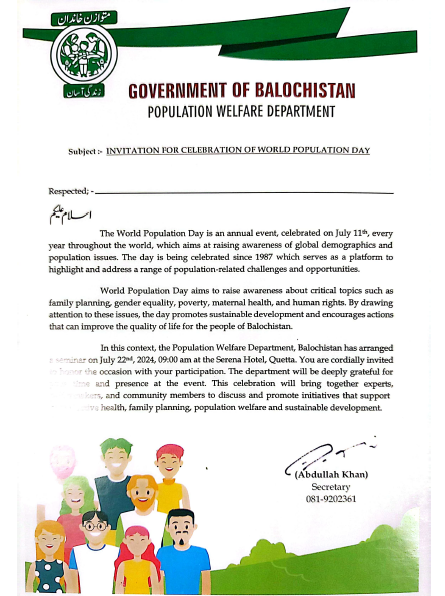
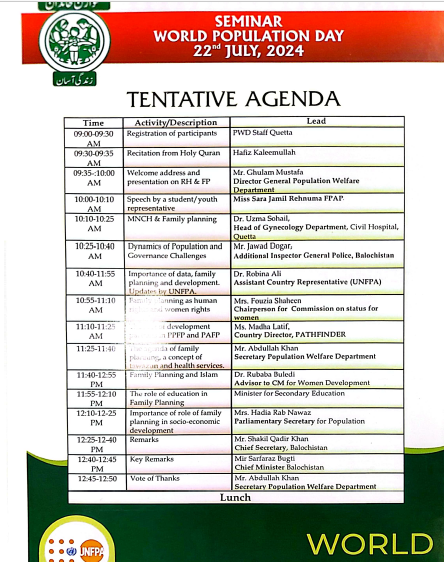
سیکرٹری بہبود آبادی بلوچستان عبداللہ خان نے خاندانی منصوبہ بندی کو ایک کامیاب ماڈل قرار دیتے ہوئے مستقبل کے لیے اسے ضروری قرار دیا۔ اور یو این ایف پی اے ، پاتھ فاٸنڈرز ، ایف پی اے پی ، رز تمام پارٹنرز ، محکمہ صحت ، تعلیم ، دیگر محکموں ، سول سوسائٹی اور میڈیا کا شکریہ ادا کیا.
At the World Population Day seminar organized by the Population Welfare Department and UNFPA Pakistan, secretary Population Welfare Department Abdullah Khan advocated for family planning as a successful model for a balanced future where all Pakistanis have access to basic amenities. #Balochistan
During the World Population Day seminar organized by the Population Welfare Department and UNFPA, Minister for Education Ms. Raheela Durrani highlighted the visible class-based differences and the need for empathy to address growing poverty and discrimination.
#WorldPopulationDay #Balochistan
عالمی یوم آبادی کے موقع پر پاپولیشن ویلفیئر ڈیپارٹمنٹ کوئٹہ کے زیر اہتمام آگاہی پروگرام منعقد۔ سیکریٹری پاپولیشن عبداللہ خان میڈیا سے گفتگو کررہے ہیں
world population day walk
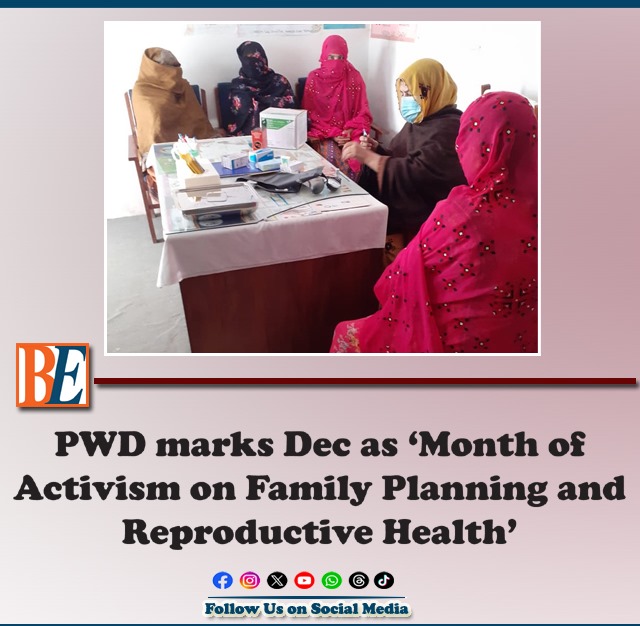
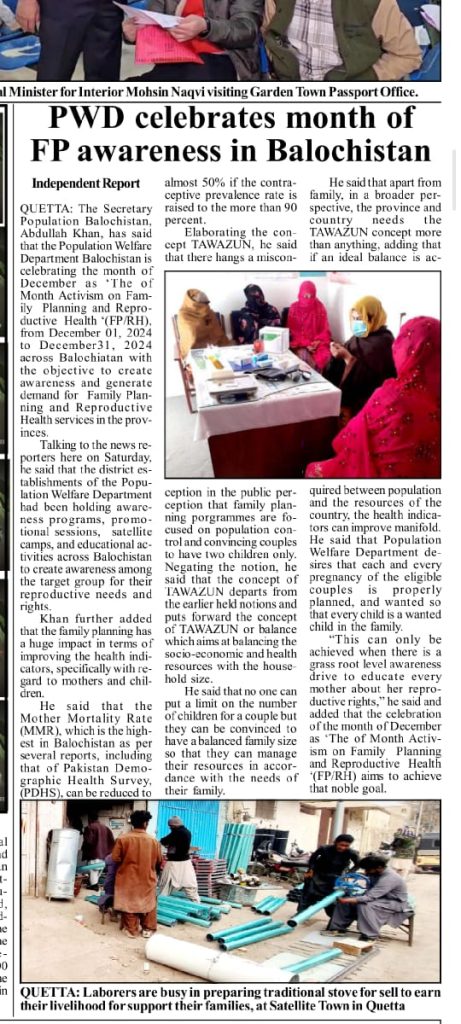
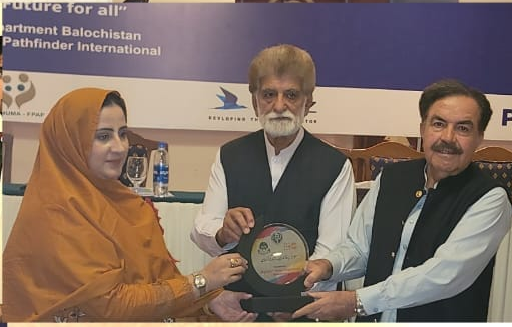
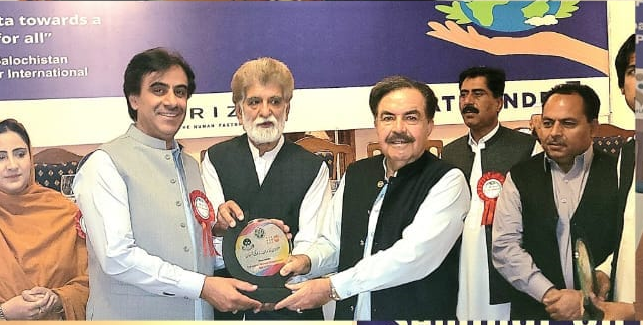

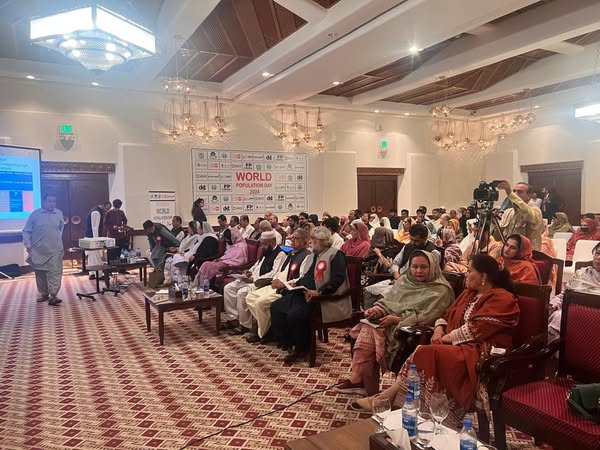
سابق وزیر روشن خورشید بروچہ،عالمی پاپولیشن ڈے کے موقع پر منعقدہ سیمینار سے خطاب
Measures vital to bring Tawzun among Resources and Population says ABDULLAH KHAN, Secretary Population Welfare Department. Read more
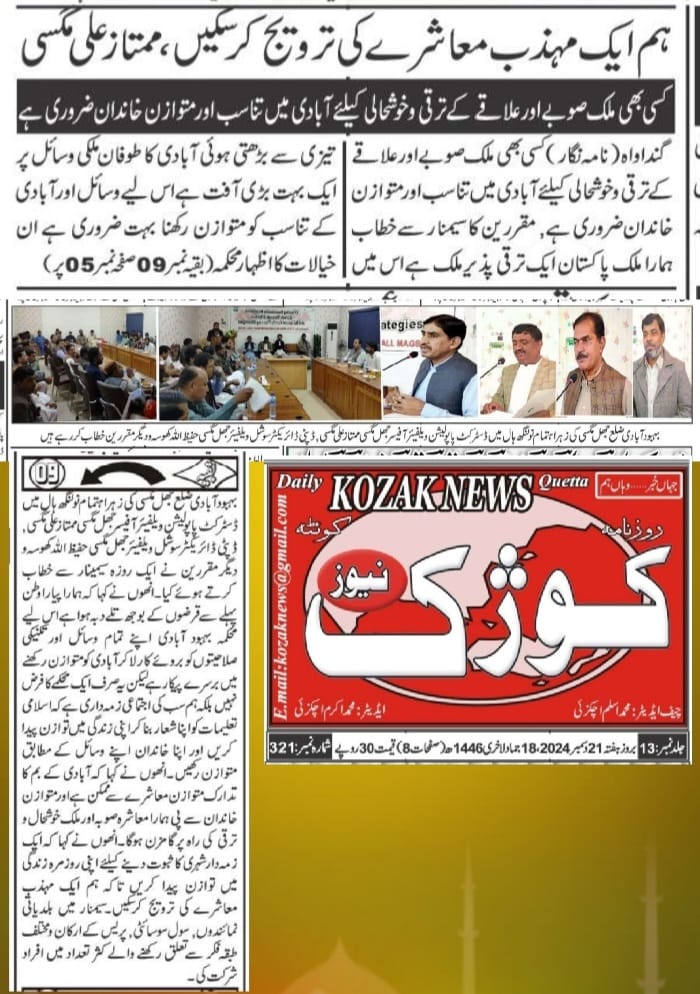
December21, 2024:
A gathering session was held today in district Jhall Magsi with religious scholars and Ulma’s of the area on the topic of ” one balanced family is assurance of social, economical and developed family “. The session was conducted in observance of the One Month Activisim on FP/RF under the theme of Tawazun( December 1, 2024 to December 31, 2024).
The religious speakers throw light on the TAWAZUN under islamic perspectives. A large number of people in various walks of life attended the session. The programme was arranged by DPWO Mumtaz Ali Magsi under the Population Welfare Development Programme.
Population Boom in Balochistan: Public Policy and Development Challenge
QUETTA: Balochistan is observing December as the month of activism on family planning and reproductive health for creating awareness about the issue of population growth as the country is facing repaid increase in the population that is creating various challenges for the future generation.
The secretary of the Population Welfare Department of Balochistan, Abdullah Khan, stated this while talking to reporters on Sunday.
He said that the population welfare department started various programmes and campaigns from December 1, which will be continuing till December 31.
“The aim of observing the month of December as the month of family planning and reproduction is to provide information to people about the negative aspects of the speedy increase of population as the recent census has shown the highest population growth in Balochistan. Read more


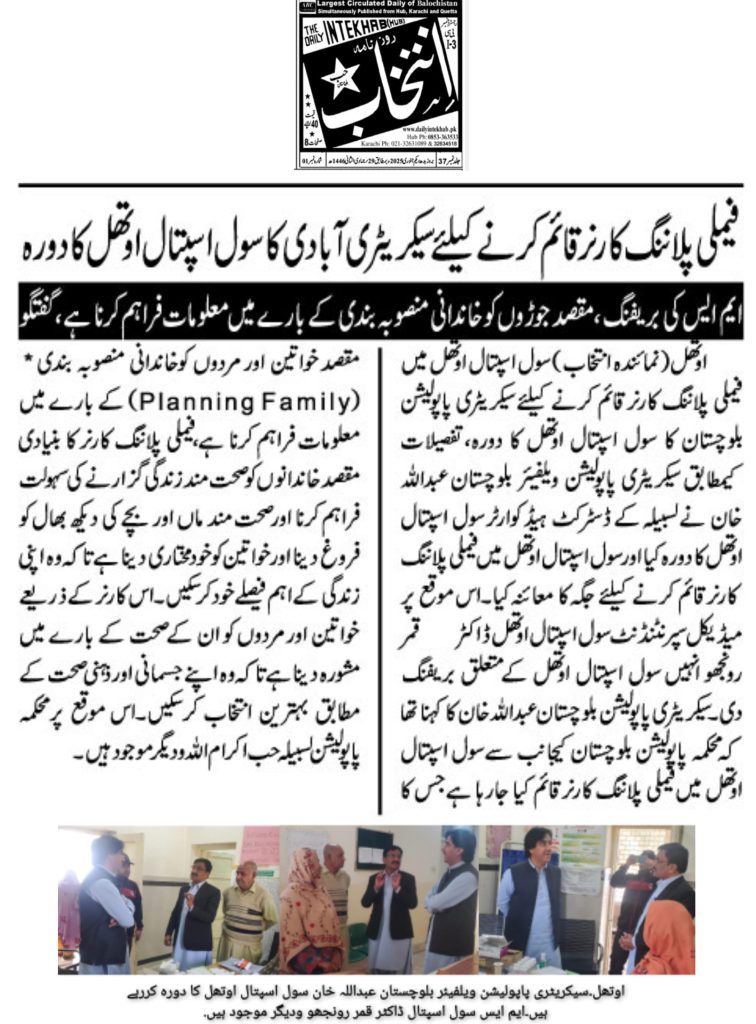

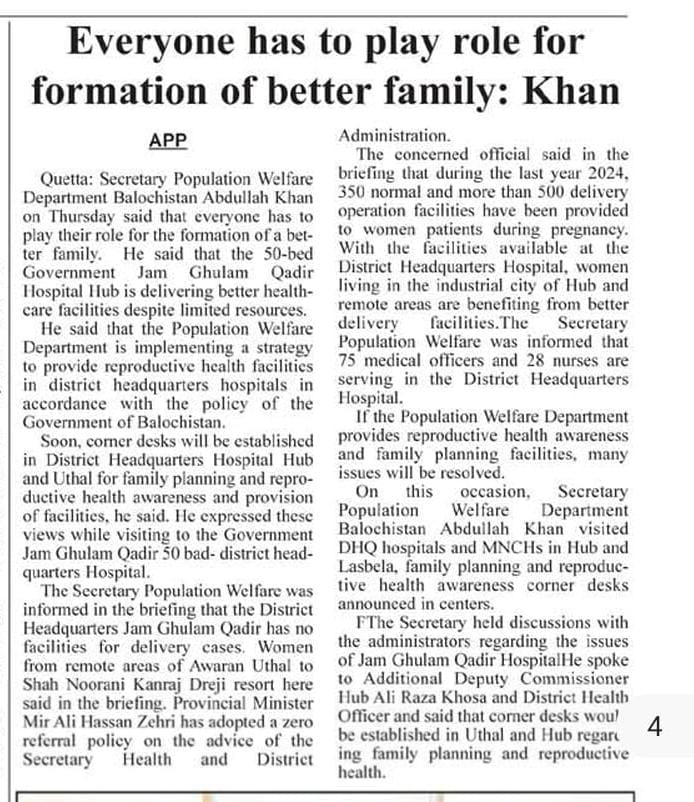
Population Boom in Balochistan: Public Policy and Development Challenge

Population Boom in Balochistan: Public Policy and Development Challenge

At the core of these crises is unbridled population growth in the province, which has the potential to undermine the very roots of society. The traditional approach of policymakers in Balochistan is to draw comparisons between the population and the vast mineral wealth, landscape, and resources of the province. This viewpoint originates from a purely political standpoint, where the National Finance Commission (NFC) grants a heavy weightage, 82.98%, to the population for a share in the divisible pool. This casts a dark shadow on the consequences of population growth on women, children, and their basic human rights. In fact, the human rights-based approach to family planning is a systematic process to ensure that attention to human rights principles pertaining to family planning is rooted in all program phases (UNFPA). A cursory glance at the data shows that the population of the province in 1951 was 1.2 million, which has grown to 14.89 million in 2023, reflecting a more than tenfold increase. The population in urban areas was 28% in 2017 against 72% rural, which has become 31% in 2023 against 69% rural. Poor law and order, unemployment, intermittent drought, and the adverse effects of climate change are pushing the rural population to shift to urban areas, presenting another heavy challenge for the government. Studies show that a lack of reproductive health (RH) and family planning (FP) results in poor health indicators, such as high maternal mortality, child mortality, infant mortality, and malnutrition. There is a vicious cycle of high child mortality and lack of family planning leading to high fertility rates and maternal deaths. High child mortality is not only a cause but also a consequence of a lack of family planning. This vicious cycle can be broken by adopting family planning. As a consequence, as many as 298 mothers die in 100,000 live births in Balochistan, 1100 women die annually due to pregnancy-related causes, 29,000 children under age 5 die annually, 40% of children are underweight, 16% suffer from wasting, and around 52% suffer from stunting.Lorem ipsum dolor sit amet, consectetur adipiscing elit. Ut elit tellus, luctus nec ullamcorper mattis, pulvinar dapibus leo. Read more
Drugs regulation is one of the major issues in Pakistan. Access to safe and efficacious medicine 💊 is the mandate of the Drug Regularatory Authority of Pakistan(DRAP), which needs to strengthened.
My article on DRAP published in the Balochistan Times today( December20, 2020.


عالمی یوم آبادی کی مناسبت ریجنل ٹریننگ سینٹر کوٸٹہ میں تقریب کا انعقاد کیا گیا
تقریب کے مہمان خصوصی سیکرٹری پاپولیشن ویلفیئر ڈیپارٹمنٹ بلوچستان عبداللہ خان اور اعزازی مہمان خصوصی پارلیمانی سیکرٹری براے محکمہ بہبود آبادی حادیہ نواز بہرانی تھی۔
تقریب میں پرنسپل ریجنل ٹریننگ انسٹیٹوٹ ڈاکٹر کوکب ، ایڈیشنل ڈاٸریکٹر پاپولیشن حبیبہ ، صوباٸی کوارڈنیٹر یو این ایف پی اے ڈاکٹر سرمد سعید خان ، ڈاٸریکٹر ایڈمن جمعہ خان ، ڈاٸریکٹر پی ایم ٹی سی نعیم کاسی ، پرنسپل ایلیمنٹری کالج ڈاکٹر حلیمہ عیوض علی ، ڈویژنل ڈاٸریکٹر کوٸٹہ عبدالستار شاہوانی ، ڈسٹرکٹ پاپولیشن ویلفیٸر آفیسر کوٸٹہ ایوب کاکڑ ، آر ایچ سینٹرز ڈاکٹرز ، واٸس پرنسپل ڈاکٹر طاہرہ جعفر اور صوباٸی کوارڈنیٹر رز کنسلٹنگ ڈاکٹر نسیم اللہ نے شرکت کی۔
سیکرٹری پاپولیشن ویلفیر ڈپارٹمنٹ عبداللہ خان نے ورکشاپ کے شرکا۶ سے خطاب کرتے ہوے کہا کہ آبادی میں اضافہ کے مطابق اتنے ہی وسائل کی فراہمی ہر ملک کیلئے بڑا چیلنج بن چکا ہے۔ اس وقت بلوچستان کو درپیش بڑھتی ہوٸی آبادی کے چیلنجز ، خاندانی منصوبہ بندی ، بچوں کی پیداٸش میں وقفہ بڑھانے اور بڑھتی ہوٸی آبادی کے باعث صحت کے سہولیات کے فقدان سے متعلق جامع منصوبہ بندی کی ضرورت ہیں ۔
خوشحال معاشرے کے قیام کے لئے وسائل اور آبادی میں توازن لازم و ملزوم ہے۔اور اپنے وسائل کے مطابق بچے پیدا کئے جائیں تاکہ ماں اور بچے دونوں کی صحت اچھی رہے اور خاندان یا کنبہ خوشحالی کے ساتھ پروان چڑھ سکے۔سیکرٹری پاپولیشن ویلفیئر ڈیپارٹمنٹ بلوچستان عبداللہ خان
اس امر میں کوئی دو آراء نہیں کہ وسائل کے مطابق کنبے کی تشکیل متوازن خاندان کی مضبوط بنیاد ہے اورصحت مند معاشرے کے لئے متوازن خاندان انتہائی ضروری ہے اور یہی خوشحال بلوچستان کے خواب کو عملی تعبیر دینے کیلئے بھی ناگزیر ہے۔ متوازن معاشرے کی تشکیل میں ماں کاکردار کلیدی اہمیت کاحامل ہے۔ سیکرٹری پاپولیشن ویلفیئر ڈیپارٹمنٹ بلوچستان عبداللہ خان
ہمیں بحیثیت قوم وطن عزیز کے روشن کل کیلئے متوازن خاندان کی تشکیل کا عہد کرنا ہوگا اور عوام خصوصاً خواتین میں متوازن خاندان کی افادیت اوراہمیت کے بارے میں شعور مزید موثر انداز میں اجاگر کرنا ہوگا۔سیکرٹری پاپولیشن ویلفیئر ڈیپارٹمنٹ بلوچستان عبداللہ خان
بلوچستان حکومت محکمہ پاپولیشن ویلفیئر کے ذریعے صوبہ بھر میں خاندانی منصوبہ بندی کی قابل بھروسہ اورمفت سہولیات فراہم کررہی ہے اور خاندانی منصوبہ بندی سے متعلق خدمات کا دا ئرہ کار بڑھانے کیلئے تمام ممکنہ وسائل بروئے کار لائے جارہے ہیں۔پارلیمانی سیکرٹری براے محکمہ بہبود آبادی ,حادیہ نواز بہرانی
خواتین کے ساتھ مردوں کو بھی سہولیات مہیا کی جارہی ہیں تاکہ متوازن خاندان کے خواب کو شرمندہ تعبیر کیاجاسکے۔پارلیمانی سیکرٹری براے محکمہ بہبود آبادی ہادیہ نواز
تقریب میں آبادی کے حوالے سے مختلف تقاریر اور ٹیبلو پیش کیے گٸے اور آگاہی واک کی گٸی اچھی کارکردگی دکھانے والے اساتذہ اور طالبات کو شیلڈ سےنوازا کیاگیا..

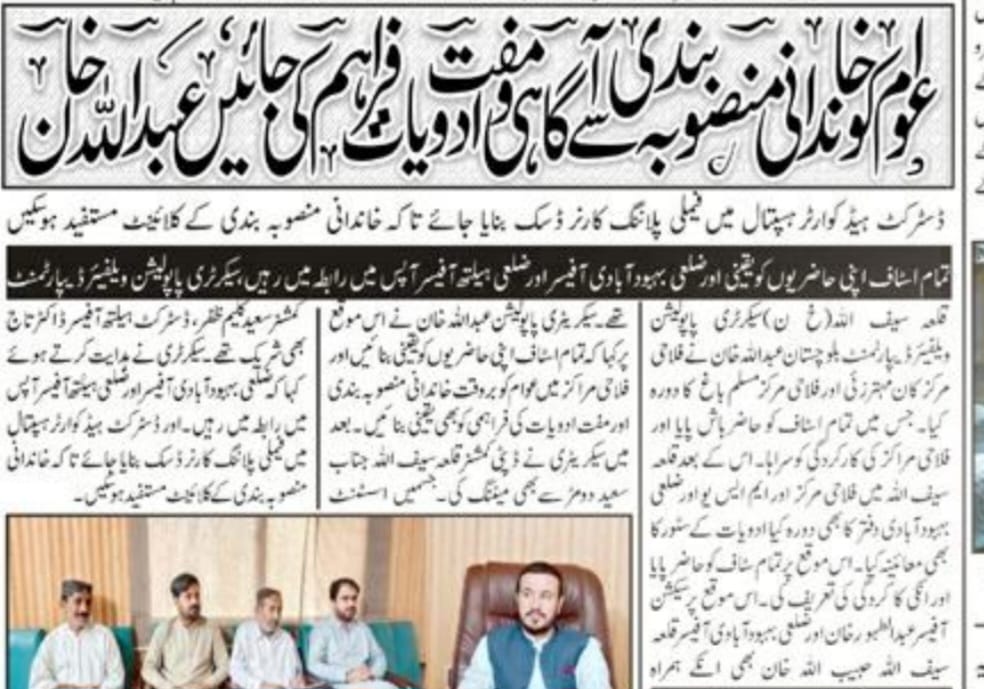

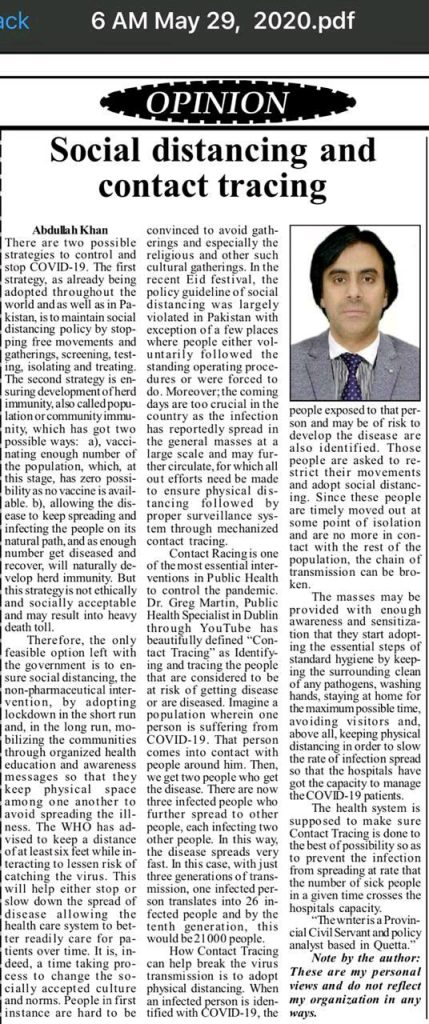
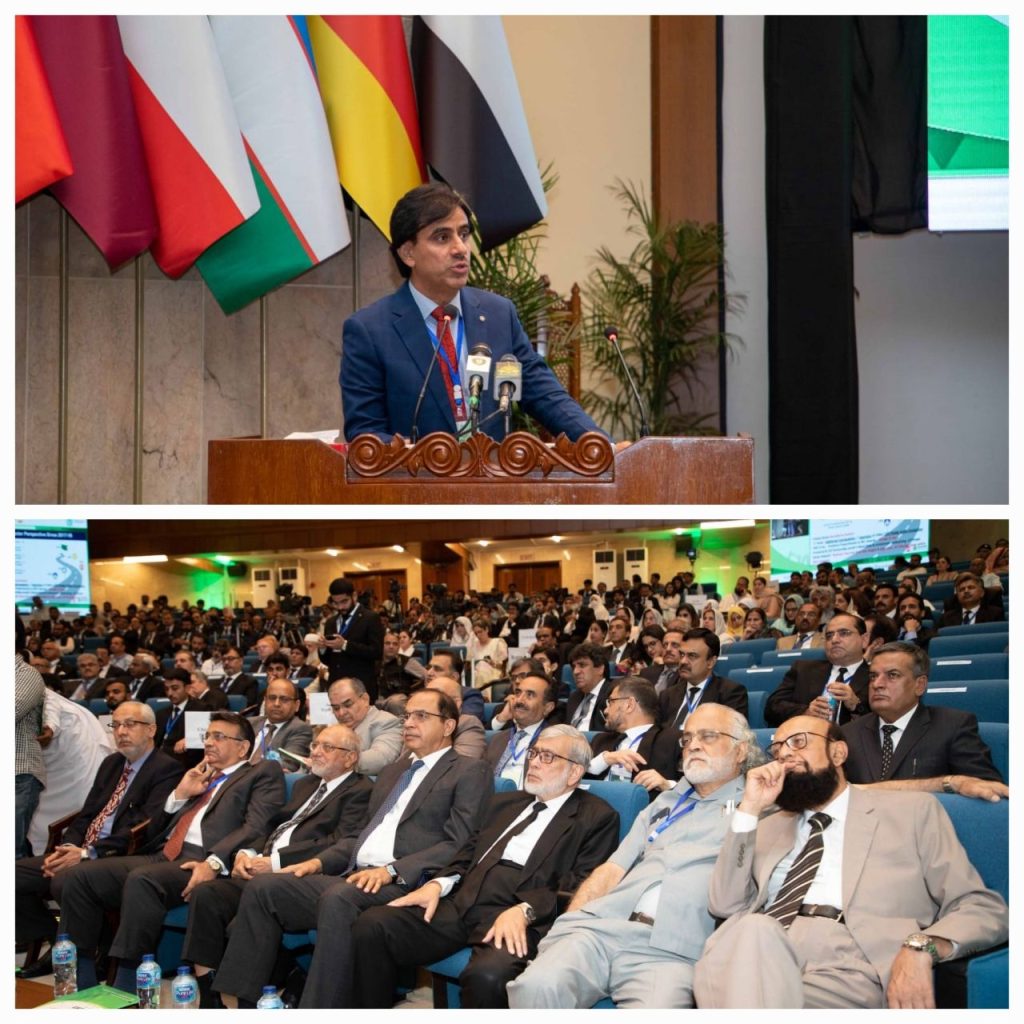
Abdullah Khan
Secretary Population Welfare Department, GoB (Views my own and do not reflect or represent my organization)Secretary Population Welfare Department, GoB (Views my own and do not reflect or represent my organization)
1yr •
I had the opportunity to talk on Human Rights Based Approach to Family Planning and Reproductive Health Services presenting the case of the province of Balochistan – Pakistan in the ” National Conference on Resilient Pakistan: Calibrating Population and Resources ” held on July14-15, 2023 at the Supreme Court of Pakistan, Islamabad. The progress made on the decisions of the Council of Common Interest(CCI) and National Population Action Plan was highlighted. The Conference was organized by the Law and Justice Commission of Pakistan & the Minsitry of National Health Services , Regulations & Coordination Government of Pakistan.
It is a tested argument that unless family planning and reproductive health services are prioritised, health indicators can not be improved. For achieving the goal of good health and well being for attaining potential human capital , multi-sectoral approach must be adopted to prevent unwanted pregnancies , improve CPR and make family family Services equitably accessible to the communities.
Measures vital to bring Tawazun among resources, population: Abdullah Khan
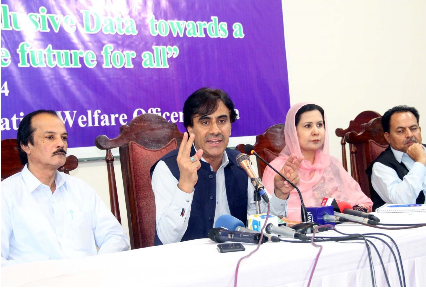
QUETTA (APP): Balochistan Secretary for Population Welfare Abdullah Khan while addressing the participants of the seminar said that concrete steps to be taken to bring Tawazun among the available resources and population.
He said that along with the efforts of the government, social organizations and religious and political parties also need to play their role to create awareness among people to control the population.
Abdullah Khan said that a balance between resources and population is a guarantee of the health and prosperity of the public, adding that the unbridled population growth is one of the serious challenges that the country is facing today. He said that the seminar was organized to make people aware of the dangers of the growing population and to create awareness about the issue.
Abdullah Khan said in view of the country’s social traditions, values and religious guidance, efforts are needed to take measures to control the growing population.
Parliamentary Secretary for Population Welfare, Hadiya Nawaz, while addressing the seminar, said that serious steps should be taken to educate parents about their responsibilities to provide the best education and health facilities to their children. She said the Ministry of Religious Affairs should play its role in this issue, adding that women’s education is very important in population control.
Hadiya Nawaz said education and economic independence of girls should be targeted. She added that encouraging higher education for women can empower them to make informed decisions about their families.
Provincial Head of UNFPA Dr. Sarmad Saeed Khan said that to control the population, the fair distribution and better use of the country’s resources will create hopes of raising the standard of living. He said that steps are needed to ensure all facilities including clean drinking water, availability of education, medicine, health, adequate food, housing, and means of transportation and drainage to the public. read more
An informative and analytical article on Population Growth in Balochistan by Abdullah Khan, Secretary Population, Balochistan Published in the Dawn


Decades of change
Balochistan, Pakistan’s largest province by area, has experienced boundless demographic changes over the past seven decades.
From a modest population of just over one million in 1951 to nearly 15m in 2023, the province’s growth tells a story of transformation driven by health advancements, infrastructural development, migration, and socioeconomic shifts.
Moreover, it is important to provide an insightful analysis to the political leadership and policymakers, who still believe rapid population growth is not an issue in Balochistan. If this trend continues, there will arise serious social and economic challenges in the water-stressed region.
The census data for Balochistan, spanning from 1951 to 2023, illustrates significant demographic shifts and a remarkable population increase over the decades. According to the Census Reports (1951-2023), in 1951, the population stood at 1.17m. By 1961, it had grown modestly to 1.35m, with an average annual growth rate of 1.5 per cent. A pronounced surge followed between 1961 and 1972, as the population climbed to 2.43m at an accelerated growth rate of 5.16pc. This rapid increase can likely be attributed to improvements in healthcare, declining mortality rates, and, especially, high fertility levels.
The most dramatic population growth occurred between 1972 and 1981, when the population nearly doubled to 4.33m, marking an unprecedented annual growth rate of 7.09pc. This period of expansion coincided with socioeconomic developments, enhanced health services, and migration into the region. But the causal relationship must be authenticated through a proper research study to determine the real factors behind this all-exponential growth. Read more




